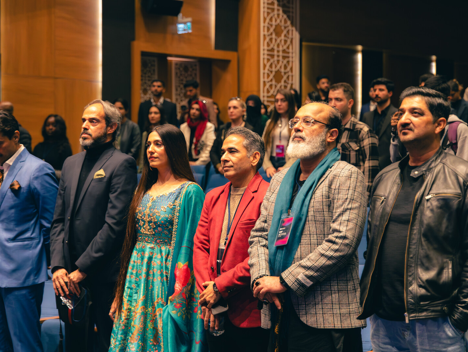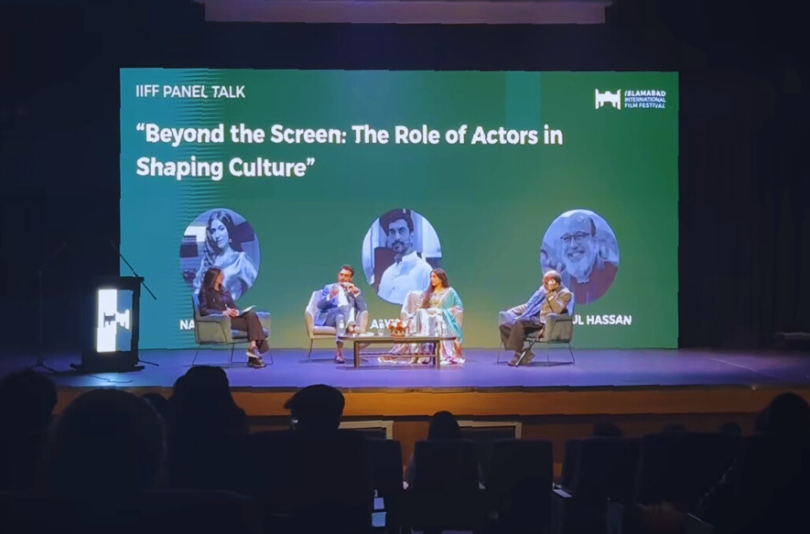Last weekend- on the 26th and 27th of April, Istanbul rolled out the red carpet for the international filmmakers community, exploring cinema across borders.
The Islamabad International Film Festival (IIFF) hosted its second annual premiere at Dr. Kadir Topbaş Kültür Sanat Merkezi, showcasing over 40 world-class films to be viewed by both Pakistani and Turkish filmmakers and enthusiasts.
The event, free and open to the  public, transformed the venue into a buzzing space of cultural exchange, creativity, and cinematic magic. From 12:00 to 23:00 each day, students, cinephiles, artists, and curious locals filtered in to experience a lineup that reflected both shared struggles and unique perspectives from all over the globe.
public, transformed the venue into a buzzing space of cultural exchange, creativity, and cinematic magic. From 12:00 to 23:00 each day, students, cinephiles, artists, and curious locals filtered in to experience a lineup that reflected both shared struggles and unique perspectives from all over the globe.
But perhaps even more compelling than the films themselves is the story of how this festival came to be, and the 22-year-old filmmaker who made it happen.
“I didn’t see a space that welcomed young new voices in Pakistan,” says Hassaan Imtiaz, the founder of IIFF, during our conversation at the venue.
Hassaan, currently a third-year student at Medipol University, grew up in Saudi Arabia before moving to Pakistan at the age of 16. By 19, he had already made his first short film, Asliyat, followed by Zaki and 509- intimate, thoughtful explorations of society with a Gen Z twist of horror and court room drama. His work was internationally recognised, earning 12+ awards and 30+ nominations across global festivals.
And yet, he felt an eerie silence at home.
“There was this gap, no real community, no audience, no encouragement for young filmmakers to share their stories locally,” he explains. “I could either keep complaining about that, or do something.”
IIFF was born out of that choice.
A festival beyond borders
Initially launched in 2024, the first edition of the festival was an intimate screening to gauge the interest of and the impact on the community, partnered with Medipol university. A year later, the second edition scaled significantly. The team received over 1,000 film submissions from 96 countries, and for the first time, made the festival international- with Istanbul as the chosen stage.
Why Istanbul?
“Because this city truly understands,” says Hassaan. “Istanbul recognizes the intricacies of identity and multiculturalism. It serves as a bridge, just as IIFF aims to be. I frequently travel between Islamabad and Istanbul, and I wanted to establish the festival internationally before taking it local. By the time we launch the third edition- which will be held in Islamabad, I anticipate that our local media industry will be reaching out to us itself to be involved in the festival since we have already established our presence on an international scale.”
Inside the Festival: Films, panels, and conversations that mattered
 Walking into the venue felt like stepping into a cultural intersection. The hall was packed with students, artists, and film enthusiasts from across the region. The energy was inclusive, there were no velvet ropes or hierarchy, just a collective love for storytelling.
Walking into the venue felt like stepping into a cultural intersection. The hall was packed with students, artists, and film enthusiasts from across the region. The energy was inclusive, there were no velvet ropes or hierarchy, just a collective love for storytelling.
Each film offered a unique lens. Some delved into personal trauma, others critiqued systems of power. From experimental shorts to documentaries, the diversity was striking.
In addition to the film screenings, the festival hosted panel discussions on topics like:
· “The Role of Actors in Shaping Culture”
· “Filmmaking Struggles: Budget, Visibility, Voice”
· “Bridging the Gap: Where Do We Go From Here?”
Audience Q&As turned into debates. People stayed long after screenings, discussing themes over tea. It wasn’t just about consuming art, it was about interacting with it.
What it took to make IIFF happen
Behind the scenes, IIFF remains a labor of love. Hassaan admitted the organizational process was intense- filled with logistical challenges, sponsor negotiations, and communication gaps. Coordinating teams across seas, securing visas for guests, and selecting through the film submissions were just a few of the hurdles.
“Honestly, some days I didn’t think we’d be able to pull it off,” he laughs. “But my team was so hardworking- comprising of 80% students and 20% of mentors, all working together tirelessly for my passion project, I knew it has to be worth it.”
Remarkably, this Istanbul edition was still student-led. No corporate agency. No million-dollar backing. Just a team of passionate young people creating something bigger than themselves. The festival ran entirely independently and free of cost, with help from fellow students and the support of a surprisingly robust list of sponsors and partners. Despite being only in its second year, IIFF managed to draw a lineup of sponsors that many larger festivals would envy, these included: Bab-i Alem, AIESEC, Rami Kütüphanesi, Crowne Plaza Hotels & Resorts, UDEF, Yabangee, and so on.
Each partner brought something to the table- whether it was venue access, promotional support, or simply helping elevate young voices across borders.
What’s next for IIFF?
IIFF is now poised for further growth. The next festival is scheduled to return to Islamabad in 2026, with plans to expand community workshops, networking sessions, panel sessions, and cross-border collaborations.
“This isn’t a one-time thing,” says Hassaan. “We’re building something sustainable. The dream is to turn IIFF into a creative ecosystem, not just a festival.”
When asked what he’d do differently next time, Hassaan smiles, “I think there’s always room for improvement, but I have no complaints from my team, they’ve truly given it their best. Personally i feel that this season was the ground work- building a base, now its time to start adding the building blocks.”
IIFF wasn’t just another event in Islamabad or Istanbul’s calendar. It was a declaration- a signal that Gen Z creators aren’t waiting for mainstream media to hand them a mic. They’re building their own stage, writing their own stories, and screening them for the world.
And if you missed it this year? Don’t worry. IIFF isn’t going anywhere.
It’s just getting started.








Yorum yazın